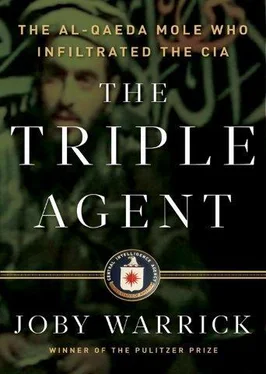“It was shocking to see so many people,” one of Panetta’s aides said afterward.
Panetta made his way through the crowd, shaking hands and giving hugs. Then he spoke briefly to the group.
“You should know two things,” he said. “We will honor your loved ones in an appropriate, dignified way, starting here at Dover. And we will keep up the fight, because that is what they would have wanted us to do.”
In Jordan, meanwhile, other CIA and State Department dignitaries gathered in Amman for a royal funeral for Ali bin Zeid, a ceremony that began with the red-carpeted arrival of the Mukhabarat captain’s body accompanied by an honor guard of twenty-four elite soldiers in traditional red and white kaffiyeh head scarves. A bag-pipe corps led an official funeral procession that included bin Zeid’s cousin King Abdullah II, along with Queen Rania and their oldest son, Crown Prince Hussein.
American families gathered to mourn in a series of private services that stretched from coastal Oregon, to Rockford, Illinois, to suburban Boston. Fellow SEALs gathered in a navy chapel in Virginia Beach, Virginia, to salute their fallen comrade, Jeremy Wise; while Harold Brown Jr.’s two oldest children, Paul, twelve, and Magdalena, eleven, played a duet on saxophone and clarinet to honor their father in services in a Catholic church in his boyhood home of Bolton, Massachusetts. Narcotics detectives and motorcycle cops wept over Scott Roberson’s coffin in Akron, Ohio, while in an Annapolis, Maryland, cathedral, one of Darren LaBonte’s CIA comrades recalled the bravery of the former Army Ranger known as Spartan. The officer compared his former comrade with Leonidas, the ancient warrior-king of Sparta, who, when ordered to surrender his weapons by a vastly superior Persian force, replied, “Molon labe”— “Come and get them!” Jennifer Matthews’s life was celebrated in separate services at the family’s church in Fredericksburg, Virginia, and in the small brick congregation near Harrisburg, Pennsylvania, where she had attended Sunday school as a girl. A hush fell over the packed church at Fredericksburg as Matthews’s oldest child, a twelve-year-old girl, stood up to sing, in a fine soprano, lyrics from Les Miserables , her mon’s favorite musical. Some will fall and some will live , she sang. Will you stand up and take your chance?
Mindy Lou Paresi, honoring her husband’s wishes, made arrangements for Dane Paresi’s burial in the same Willamette veterans’ cemetery in Portland where he had played army as a boy. The body, dressed in the Green Beret uniform and paratrooper’s boots Mindy Lou had carried with her to Dover Air Force Base, made its final cross-country trip in a metal casket. A closed-coffin reception was planned for a close circle of friends and family members, but before it started, Dane Paresi’s widow asked to spend some time alone with his body. She prayed quietly for a few minutes, then walked to the coffin and carefully opened the lid. Dane’s face was wrapped in gauze, and there were white gloves on his hands.
Mindy Lou needed to fully understand what her husband had endured, so she willed herself to touch his broken body. She caressed his swollen, shrouded face. She felt the empty parts of the glove where fingers were missing. She let her hands pass along the length of his uniform, feeling the broken bones through the fabric.
She kissed her husband one last time and then closed the coffin.
On February 5 the families of the dead officers and hundreds of their CIA colleagues gathered at Langley for a last tribute. A massive winter storm was bearing down on the capital as the motorcades arrived carrying the elites of Washington’s national security community, from the Pentagon to Congress to the White House. In the CIA’s marbled foyer, a large group of parents, spouses, and young children sat in folding chairs in front of a dais as a string ensemble played an adagio. Facing them from the platform was President Barack Obama, flanked by Panetta and Kappes.
The president spoke first, at one point addressing the children in the front rows.
“I know that this must be so hard and confusing, but please always remember this: It wasn’t always easy for your mom or dad to leave home,” Obama said. “But they went to another country to defend our country. And they gave their lives to protect yours.
“They served in secrecy, but today every American can see their legacy,” he continued. “For the record of their service is written all around us. It’s written in the extremists who no longer threaten our country—because they eliminated them. It’s written in the attacks that never occurred—because they thwarted them.”
Panetta’s words were largely aimed at the slain officers’ CIA family.
“We are on the front lines,” he began. “We will carry this fight to the enemy.”
The agency’s secret cables had brought initial reports of successes in northern Pakistan, but in recent days the storm clouds had again gathered, with warnings of new threats from al-Qaeda cells from East Africa to the Arabian Peninsula and signs of renewed resilience by al-Qaeda’s leaders. The agency confirmed that Hakimullah Mehsud had narrowly escaped the attempt on his life and was again furiously threatening to find ways to kill Americans. Osama bin Laden had just resurfaced with a new audiotape praising the attempted bombing of the Detroit-bound passenger jet on Christmas Day and promising that Americans would “never dream of peace.” Sheikh Saeed al-Masri, minus one of his bodyguards, was living somewhere in the Pakistani hills, listening for the buzzing of Predators and plotting his next move. The war was far from over.
“Our resolve is unbroken,” Panetta continued, “our energy undiminished.”
After the speeches a CIA officer sang a mournful ballad, and the crowd slowly filed out of the headquarters building. It was now dusk, and the first clots of thick snowflakes started to fall.
Arlington, Virginia—May 21, 2010
Nearly five months passed without a proper burial for Elizabeth Hanson, but at last it was happening. There had been hurdles to overcome, including initial Pentagon resistance to burying non-veteran CIA officers in the nation’s most prestigious military cemetery. Leon Panetta, who was accustomed to plowing through bureaucracies when he needed to, called on his old friend Robert Gates, a former CIA director and now the Obama administration’s defense secretary. Soon it was settled: Though a civilian, Hanson would receive the Arlington burial her family wanted. The date for this, the last of the Khost interments, was set for May 21, and Panetta, as always, would be there.
But the date arrived to find the agency’s senior leadership unusually distracted. That same morning the CIA director returned home from two days of urgent meetings in Islamabad with Pakistani government officials. Panetta and National Security Adviser James L. Jones made the trip together to share information about a young Pakistani-American charged with trying to blow up New York’s Times Square with a car bomb on May 1. The suspect, an out-of-work financial analyst named Faisal Shahzad, had told police he had received training for the bombing attempt during a 2009 trip to Pakistan’s border region. Eventually a video turned up of the Bridgeport, Connecticut, suspect embracing his Pakistani sponsor, Hakimullah Mehsud.
The car bomb, fortunately, had been a flop, but U.S. intelligence officials were stunned to discover Mehsud’s fingerprints all over the plot. A year earlier, Hakimullah Mehsud had been an obscure aide to a semiliterate tribal gangster living in the remote mountains of northwestern Pakistan. Now, catapulted into Taliban leadership by the death of his cousin Baitullah in a CIA missile strike, Hakimullah Mehsud had managed to threaten American lives in the heart of its greatest city. Was this what Mehsud meant when he warned that his fighters had “penetrated the terrorist America”? How many other bombers were on their way or perhaps already here?
Читать дальше












